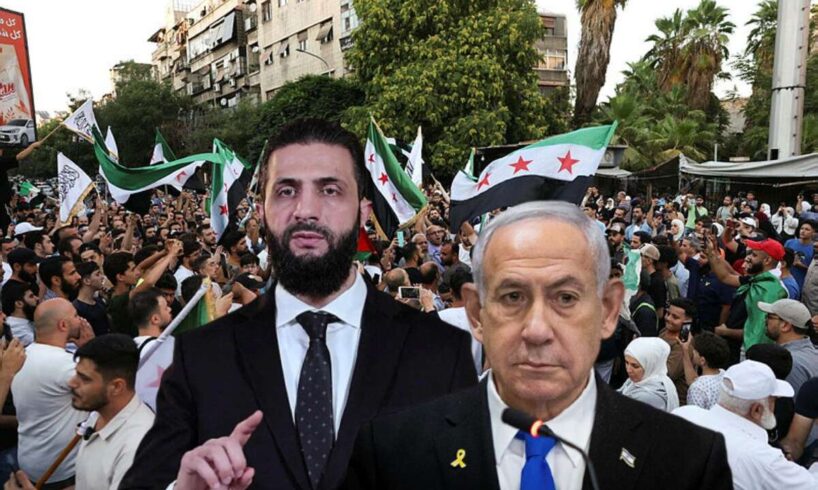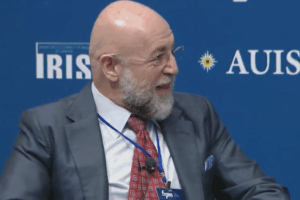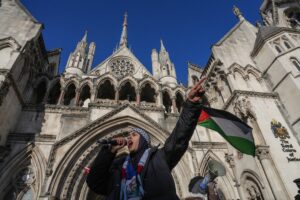
“Jihadist.” That’s the term Israelis reflexively use for Syria’s president, Ahmed al-Sharaa (also known as Abu Mohammad al-Julani during the Syrian Civil War). The issue is, this label doesn’t capture the man’s true nature. Reality, it seems, defies simple stereotypes. Back in 2020, Egyptian journalist Dareen Khalifa, residing in Turkey, risked her life to interview al-Julani, when he was still only the head of the Hay’at Tahrir al-Sham rebel group, in Syria’s war zones. Khalifa sought to understand him, noting his life trajectory stood out from his surroundings. Well before leading Syria, al-Julani engaged in fierce conflict with ISIS leaders: He was focused on liberating Syria, while they pursued global jihad. They even attempted his assassination. He later distanced himself from al-Qaida, though the move was largely symbolic. “You could say he’s a Syrian patriot. Based on his history and statements, he’s not part of global jihad and even opposes it,” Khalifa concluded after lengthy discussions with him. She shared this with me in a November 2024 phone call, shortly after he ousted Bashar Assad in a surprise move.
Israeli Druze at the border with Syria on Wednesday July 17, 2025 (JINI/Ayal Margolin)
The past eight months have validated her view. As Syria’s president, al-Julani, now Ahmed al-Sharaa, pursued a wide array of actions signaling his commitment to rebuilding Syria and fostering peace with Israel. He repeatedly affirmed this stance and avoided any military or rhetorical threats against Israel – quite the contrary. Last week, Syria initiated the naturalization of thousands of “Palestinian refugees” residing there since 1948, effectively challenging the Arab narrative of “the right of return.” Could Israel ask for more? Would Yahya Sinwar have done this? Al-Sharaa made it clear countless times he has no intention of fighting Israel. He blocked Iranian weapons shipments across his borders, stayed silent on the IDF’s seizure of Mount Hermon’s peak and other sovereign Syrian territories, made no claims on the Golan Heights, and engaged in talks aimed at normalizing ties with Israel, per foreign reports.
The world isn’t waiting
Highly serious proposals were laid out. Discreet negotiations occurred behind the scenes. Just a week ago in Washington, Prime Minister Benjamin Netanyahu and his team spoke of Syria as a potential peace partner before Saudi Arabia, even as the Gaza war persists. I was present. Optimism was palpable. Why should Israel pursue peace with Syria? First, peace trumps war. Second, Syria requires economic, energy, technological, agricultural, and diplomatic support – areas where Israel can assist, binding Syria to us through mutual interests that prevent future hostility. This dynamic has held with Jordan and Egypt for decades. Third, drawing Syria closer to Israel could curb its ties with problematic players like Qatar and Turkey – and al-Sharaa has shown he can break from patrons when his interests shift. Fourth, the world moves on. Three months ago, I wrote in Israel Hayom that “in the Arab world, the West, Turkey, and America, enough players stand to gain from absolving al-Sharaa’s past in exchange for his proper conduct moving forward. It’s unlikely the world will pause just because Israel objects.” That’s precisely what transpired. Even Donald J Trump, history’s most pro-Israel president, met al-Sharaa and removed sanctions from Syria. He didn’t wait for Israel, and sometimes wisdom outweighs being right.
But what did we do? Right after Assad’s regime fell, Israel pulled off one of its most brilliant moves, capitalizing on the moment to dismantle the Syrian military. Our forces then swiftly and boldly took Mount Hermon’s peak and other key areas. It was a masterful opportunity seized, partly paving the way for strikes on Iran’s nuclear sites – planning for which started then. Truly commendable. Yet, Israel failed to grasp that Ahmed al-Sharaa is not Yahya Sinwar. His actions since November 2024 prove it, aligning with his earlier claims of regretting his ISIS affiliation. Recently, he toured Damascus publicly with his wife, defying extremist Islamic norms. Al-Sharaa pledged religious freedom for all Syrian communities, including reopening Damascus’s ancient synagogue. However, he did establish “Sharia” as Syria’s binding law.
Video: Hundreds of Druze have crossed the border fence in Majdal Shams
Yes, it’s imperfect. His army – essentially militias – sometimes acts brutally. His and his followers’ history includes talk of “conquering Jerusalem.” Terror groups opposing his relatively moderate stance seek to destabilize his rule. There’s much to refine, and he acknowledges it. We must keep watching him. But on the key question – is al-Sharaa a figure to cultivate and guide or an irredeemable jihadist to eliminate? – all evidence supports the former.
Israel’s mistaken initiative
Israel overlooked these nuances. Despite al-Sharaa’s steady and clear approach, our policy toward him has been erratic. For months, we labeled him a “terrorist in a suit” to the world. Recently, we shifted, treating him as a potential peace partner. Then, after disturbing scenes from Sweida, we reverted to calling him a terrorist. Clearly, we don’t grasp who he is.
Israel’s errors don’t stop there. Neither the IDF nor diplomatic officials recognized the limits of power. Seizing strategic Syrian territories is great. Setting a demilitarized zone south of Damascus is somewhat defensible. But promising to protect Druze 62 miles from the border? How? Anyone sensible knew we couldn’t deliver. Moreover, Salah Tarif, a former minister and Druze leader, said they never asked Israel to protect their Syrian brethren. It was Israel’s idea.
Video: The moment of the strike near the Syrian military general staff building, as broadcast on Syrian state television // Arab networks
This was a flawed initiative. Not only do we have our own troubles, but there’s no way to emerge unscathed from Syria’s inter- and intra-communal conflicts. Current reports suggest the recent Bedouin-Druze clash in Jabal al-Druze stemmed from a Druze kidnapping. Should we have preemptively guaranteed such provocations? Absolutely not. Plus, Syrian Druze opinions on the new regime vary – many leaders want to work with al-Sharaa. Why interfere? The Druze tradition is loyalty to their sovereign state, which is why Israel’s Druze community sacrifices immensely for us. Jewish society could learn from them.
Syria’s security forces enter the predominantly Druze city of Sweida on July 15, 2025, following clashes between Bedouin tribes and Druze fighters (Sam HARIRI / AFP) Sam HARIRI / AFP
Regarding Syria’s Druze, the best approach was letting them negotiate with al-Sharaa. What have we gained by driving a wedge? Nothing – we only lost. Our overly aggressive policy pushed Syria’s president to hint at war with Israel for the first time last night. After we needlessly destroyed his general staff and bombed his palace, we gave him no choice. We handed him a dictator’s dream: An external enemy to rally against.
What’s the average Syrian likely thinking now? “Thanks to Israel, we ousted Assad. But it seems Israel is indeed the forceful, violent state they say it is. Why did it shut down Syrian TV broadcasts yesterday?”
If there were any proof al-Sharaa sent forces to kill Druze, Israel’s actions might have been justified. But there’s none. Evidence suggests he sent forces south to Jabal al-Druze to halt the Bedouin-Druze clash – doing what a central government should in a fractured nation. Yet Israel bombed his forces while demanding he protect the Druze. How can he do that if we humiliate him before his people and strip his means?
Resetting the policy
The bottom line: Israel is undermining its own security and diplomatic interests. Since taking office until last night, al-Sharaa extended a hand for peace. We rejected it. That’s the harsh truth. It’s not too late. If Jerusalem has leadership, it must regroup and reset policy. Tell al-Sharaa we won’t tolerate a Druze massacre, but also tell the Druze they must coexist with Damascus’s regime. We can’t ensure their safety.
Smoke rises from what was believed to be an Israeli strike on July 14, 2025 near Sweida, Syria, to protect the Druze (Getty Images)
Simultaneously, Israel must curb its use of force against Syria. When there’s a security threat, we must act. But as long as al-Sharaa avoids anti-Israel actions – and he has for eight months – we shouldn’t push him to become our foe. Israel’s interest lies in a stable Syrian government. Chaos only benefits Iran and terror groups. Moreover, smart diplomacy can draw al-Sharaa closer, setting him on a path to normalization with Israel. But that requires acting from reason, not instinct.





